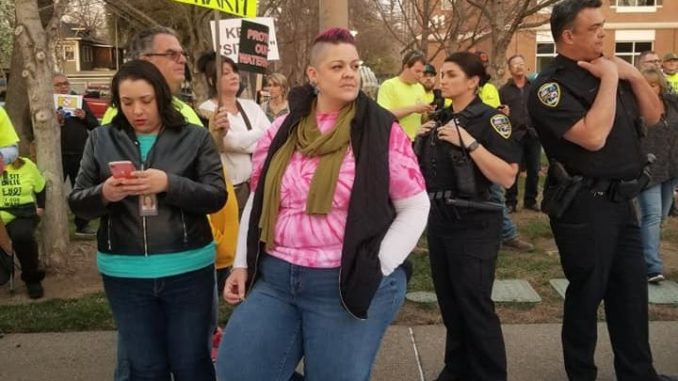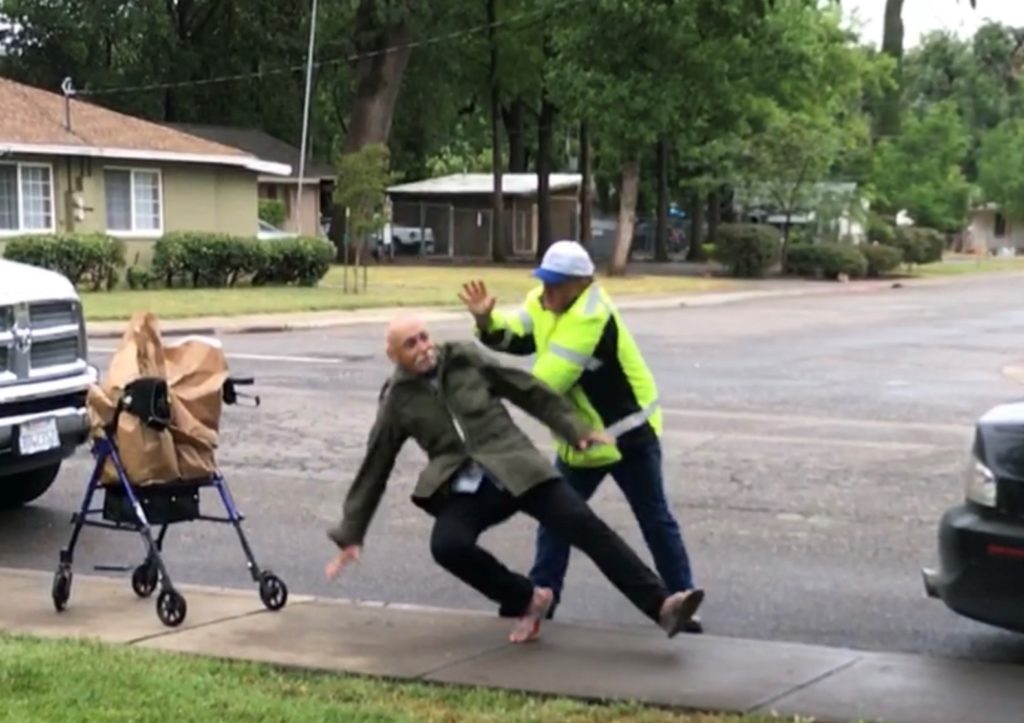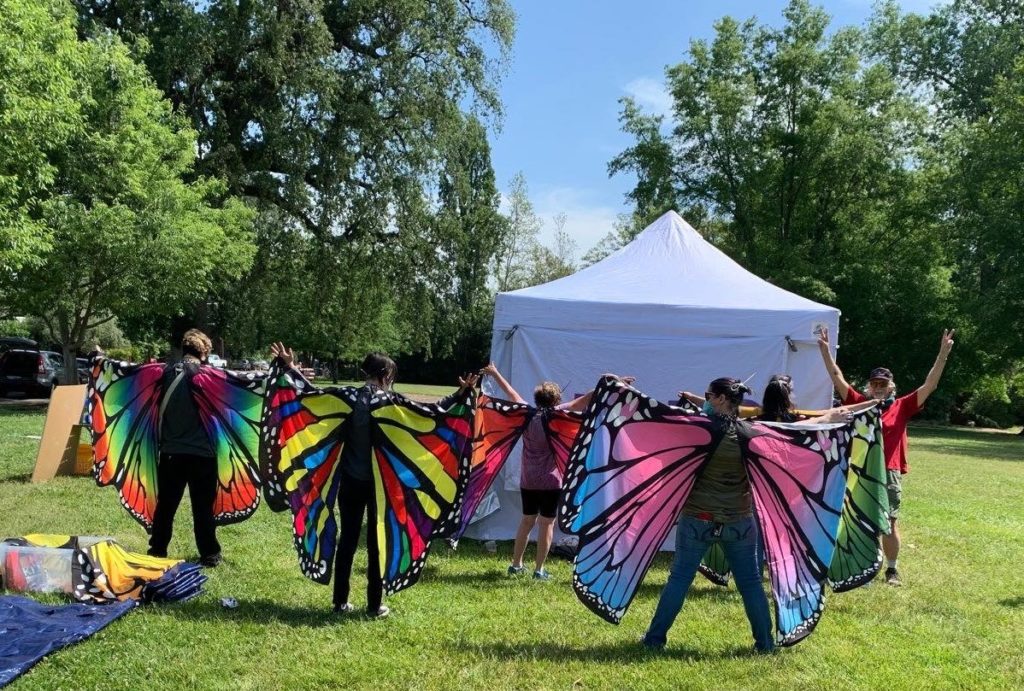
Lindsay Briggs has grown accustomed to criticism. She’s a particular bugaboo for Chicoans who, in a clique of Facebook groups, take umbrage with her social activism. Called “Professor Voldemort” in reference to her position in Chico State’s Department of Public Health and Health Services Administration, she finds herself labeled a vandal (i.e., breaking windows at Councilwoman Kasey Reynolds’ ice cream parlor, Shubert’s, which Briggs denies) and murderer (for supporting the Northern Valley Harm Reduction Coalition’s syringe access program).
“I’m a fat woman, I’m queer, I generally have a mohawk of multiple colors, and so I’m super easy to tear apart in public spaces,” she told the CN&R. “I couldn’t really care less. I have a lot of self-love.”
She also has tenure. As such, unlike others who risk their livelihoods with advocacy, Briggs can take stands provided she does so as an individual. So Briggs has become a conspicuous voice for the harm reduction coalition (NVHRC), speaking at Chico City Council meetings and engaging on social media. Moreover, after NVHRC got served with a lawsuit last month, Briggs established an online fundraiser to defray expenses for the all-volunteer collective.
Scientific research and medical experts—locally, statewide and nationwide—back the work of NVHRC, which has authorization from the state and runs without interference from city policy makers. Yet, opposition grows more hostile, with vitriol and violence coming in the wake of the litigation.
Attorney Rob Berry, founder of the Facebook group Chico First, filed suit on behalf of 20 plaintiffs in Butte County Superior Court on April 13. Gallaway Enterprises vs. California Department of Public Health, et al., names NVHRC as well as its program manager, Angel Gomez. Berry and co-counsel Walter McNeill of Redding represent lawsuit organizer Jody Gallaway and a coalition she formed, including the Downtown Chico Business Association.
Since the filing, which challenges NVHRC’s operation under state environmental laws among other legal issues, online rhetoric has increased in fervor. Beyond posts about syringes and drug use, Briggs and other NVHRC supporters have received personal attacks such as the aforementioned “You are a MURDERER!!!!!” messages.
Protests in person have ratcheted tension, too.
Sunday (May 17) at Humboldt Park, where NVHRC sets up its mobile services, one protester physically engaged a senior with a walker who objected to being recorded, knocking him to the ground, and another protester on the periphery made intimidating sounds by discharging her taser. NVHRC volunteers had previously tried to shield the area by ringing it, arms extended, with colorful butterfly-wing sheets. This time, they used barricades and umbrellas—countered by a drone, flown by a protester for aerial camerawork.

“There’s a sad sort of underbelly to a lot of it, in that a lot of these people [opposing NVHRC] we know have a loved one who has been addicted to drugs or has died from drug addiction,” Briggs said. “So most of the people who are doing this [protesting] genuinely think they are doing something good; they just have no idea how much more damage they are doing.
“Most of the people who are against the needle program are truly just scared of it and are unaware and they are reacting out of an emotional basis,” said Briggs, a public health scientist who has studied syringe access. “We need to continue to have compassionate care, we need to continue to reach [people suffering addiction] where they are—but [opponents] don’t like to listen to science and evidence, so their misguided thoughts are more valid to them than our practice experience.”
Seeking a remedy
Gallaway’s stance on NVHRC didn’t start as negative, she told the CN&R. She first understood syringe access as a needle exchange program, which made sense to her: replace a dirty injector with a clean one to prevent the spread of blood-borne diseases such as HIV and hepatitis.
That is, in fact, the primary goal of syringe access. NVHRC—which, per Gomez, describes itself as a syringe access and disposal program—also provides public health services such as testing for HIV and hepatis C, referrals to drug treatment and training in the use of nalaxone, a medication to counteract the effects of opioid overdose.
“The goal in itself is worthy,” said Gallaway, a lifelong Chicoan whose husband, Matt, ran for City Council in 2018. “In those cases where the distribution of drug paraphernalia is a little bit more controlled, there was evidence [in scientific literature] that you can reduce the spread of hep C and HIV.
“A straight distribution program, an unlimited amount of syringes into the public … it’s hard to track where all these syringes and users are going; it’s kind of a free for all. In that case, I think the way the [NVHRC] program rolled out defeats the original purpose of stopping the spread of HIV and hep C.”
Through her firm, Gallaway Enterprises, she performs environmental assessments across the Sacramento Valley. Gallaway said she and her staff have noticed more syringe litter at Chico waterways the past two years, charging that it coincides with NVHRC. (The program has operated for only the past roughly eight months.)
“I’m scared as an employer,” she said, adding that she feels her concerns have been dismissed at City Council meetings and by NVHRC. So Gallaway opted for legal action.
Buoyed by $40,000 contributed by clients, from Fresno to Redding, she rallied allies. Businesses that signed onto the suit include Chico Farm and Orchard, W.M. Campbell Real Estate and Lash’s Glass, while individuals include real estate agent Laurie Maloney, wife of former Chico Police Chief Mike Maloney.
Gallaway also approached the DCBA, a commerce organization of downtown businesses. DCBA board President Tom DiGiovanni told the CN&R that there wasn’t sufficient time to survey all members, but that the panel voted to join the lawsuit due to an overriding sentiment board members heard expressed by downtown businessowners.
“There already was anxiety, concern and a feeling of there being a real problem,” he said, “and needle distribution was the ‘one more thing’ that was making downtown less inviting, less livable….
“Fundamentally, we feel that the community can do better than what this particular program is. There’s a better approach out there that can be found and likely is out there as a better practice.”
The lawsuit mounts specific legal challenges. Through Berry and McNeill, Gallaway’s alliance seeks court rulings on whether NVHRC’s program violates the California Environmental Quality Act (CEQA) and whether state Public Health has the right to authorize NVHRC activities where otherwise they’d be locally regulated. Additionally, the lawsuit questions the coalition’s standing, as it operates not as a legally recognized nonprofit but as a collaborative of volunteers under the aegis of another organization, the North American Syringe Exchange Network.
Berry, in crafting legal arguments, looked to a case brought against the state by Orange County and several of that region’s municipalities, in which CEQA was the determining factor in halting a syringe access program. Though not a plaintiff, Berry has publicly opposed NVHRC.
“Personally speaking, I think needle litter is a hazard for the quality of life for citizens,” he told the CN&R, “so in that regard, I’m personally aligned with the idea that this program should be halted until such time as it can be shown that they know how to mitigate the negative impacts on the community for this program. In that respect, there’s no conflict between personal and professional.”
Counterpoint
Gomez told the CN&R that she could not comment on the lawsuit (and the state Public Health Department, by policy, does not comment on pending litigation). However, Gomez detailed NVHRC’s history and practices.
One of the founding members, she joined other community members in July 2018 to bring harm reduction to Chico. After networking with comparable groups throughout California, they started working with state Public Health and the national Harm Reduction Coalition to get established. NVHRC began offering naloxone training and free sharps disposal that October; applied to become a syringe access program in June 2019, and got approval to provide sterile syringes this past October.
Besides supplying and taking back needles, on-site testing and treatment referrals, NVHRC connects people with housing services, health insurance and means to get ID. The coalition also performs weekly cleanups and fields calls of needle litter via a hotline.

(Photo courtesy of Angel Gomez )
“The [number of] people who have been accessing our program has remained pretty steady; we generally get about 50 people each week,” Gomez said, even with some fluctuations amid the coronavirus outbreak.
Studies on syringe access programs find a temporary increase in discarded syringes often occurs during the first few months of operation, she continued, “and then it starts to decrease to below the syringe litter level before the program operated. It has to do a lot with [how] people aren’t really used to a safe place to discard syringes, or an acceptable place, and a lot of it has to do with people getting used to the program and its functions.”
Amid the challenge and coronavirus, Gomez said NVHRC is “continuing our normal services at this time.”
Briggs is battling to ensure the continuity. While not part of NVHRC, she has friends who volunteer and a former student co-founded the coalition. Earlier this month, Briggs launched a GoFundMe fundraiser for $10,000, the amount she estimates will be needed to successfully defend the lawsuit. As of Tuesday morning (May 19), she’d raised $5,250—more than double the amount needed for an attorney retainer.
“The narrative I’ve been pushing is that NVHRC is doing a science-based, evidence-based program,” she said. “The World Health Organization endorses needle access programs; the CDC endorses it, Butte-Glenn Medical Society, California Department of Public Health—all the people who are actual professionals, who have studied and read the literature, endorse these programs. So, Karen on Facebook, I don’t really care if that makes you uncomfortable….
“No matter how many facts you give them, no matter how much science you give them, their moral arguments are what they’re going to go with, and it doesn’t actually matter what your argument is, because they don’t care.”




I think the program would be a lot more successful and with less controversy if they had to turn in a dirty needle for a clean one but that’s not how it works. In my opinion, it should be 2 dirty ones for a clean one or something, so the program can actually insure they are helping clean up the needles.